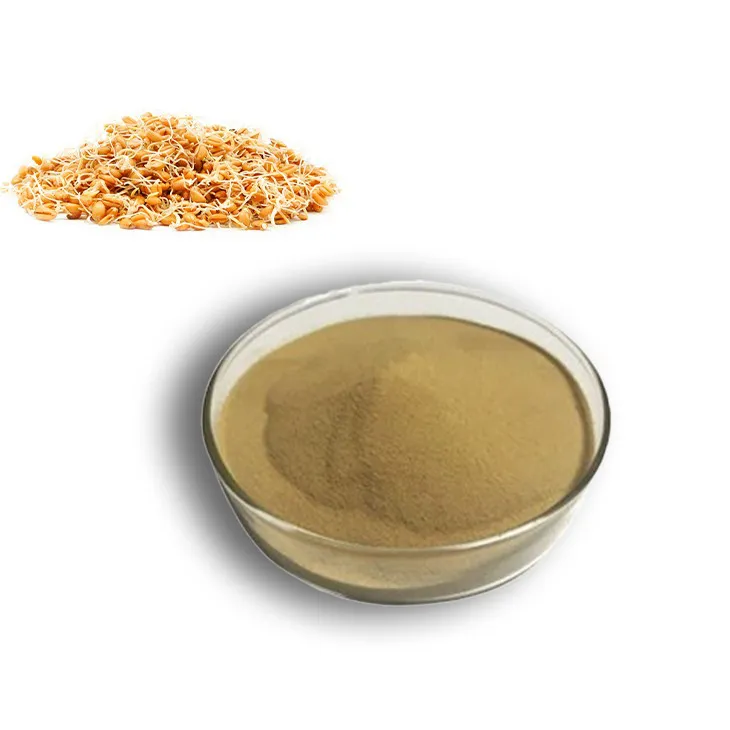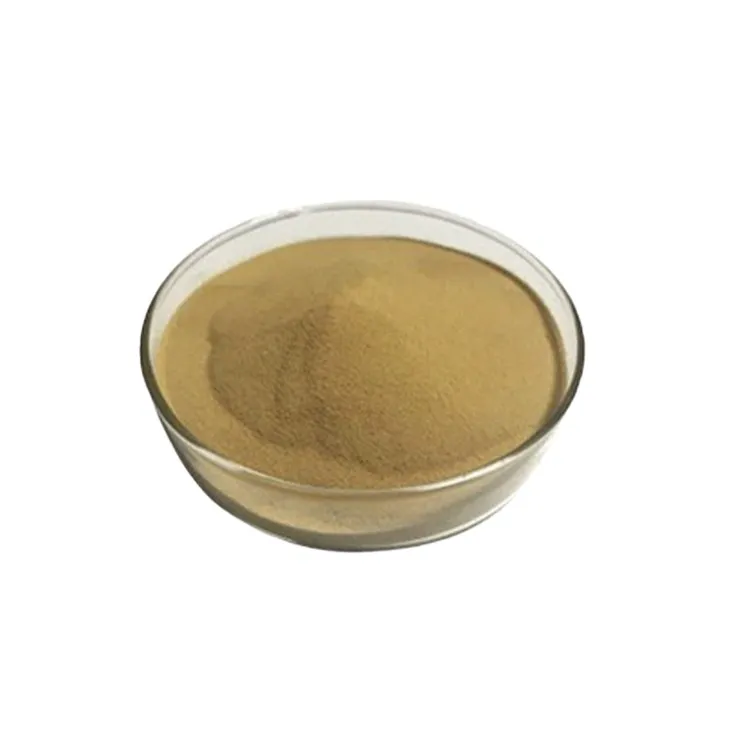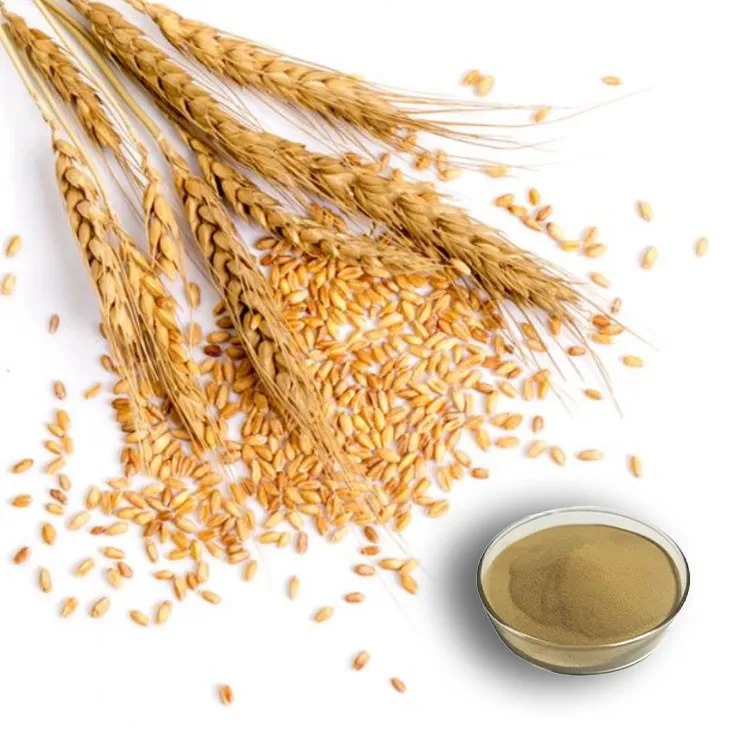- 0086-571-85302990
- sales@greenskybio.com
Entering the wheat germ extract industry? This is why you need a reliable supplier.
2024-12-10

The Value of Wheat Germ Extract
Wheat Germ Extract has emerged as a highly valuable product in recent years. It is rich in a variety of nutrients, including vitamins (such as vitamin E), minerals, and essential fatty acids. These components endow it with diverse applications across different industries.
In the health supplements industry, Wheat Germ Extract is considered a potent source of natural antioxidants. Vitamin E, in particular, helps to protect cells from oxidative damage, which is associated with various diseases and the aging process. It can also boost the immune system, improve cardiovascular health, and enhance overall well - being. As a result, it is often included in dietary supplements in the form of capsules, tablets, or powders.
The cosmetics industry has also recognized the potential of wheat germ extract. Its antioxidant properties make it an excellent ingredient for anti - aging products, such as creams, lotions, and serums. It can help to reduce wrinkles, improve skin elasticity, and promote a more youthful complexion. Additionally, the fatty acids in wheat germ extract can moisturize the skin, leaving it soft and supple.
In the food industry, wheat germ extract can be used as a natural flavor enhancer and a nutritional additive. It can be added to baked goods, cereals, and other food products to increase their nutritional value. For example, it can be used to fortify bread with additional vitamins and minerals, making it a more health - conscious choice for consumers.

The Importance of a High - Quality Product
Given the wide - ranging applications of wheat germ extract, the quality of the product is of utmost importance. High - quality wheat germ extract is essential for ensuring the effectiveness and safety of the end - products in which it is used.
In the health supplements industry, for instance, consumers rely on these products to improve their health. If the wheat germ extract used in a supplement is of poor quality, it may not provide the expected health benefits. In fact, it could potentially be harmful if it contains contaminants or if the active ingredients are not present in sufficient quantities.
Similarly, in the cosmetics industry, the quality of the wheat germ extract can directly impact the performance of the products. Low - quality extract may not have the desired anti - aging or moisturizing effects, leading to dissatisfied customers. In the food industry, poor - quality wheat germ extract could affect the taste and nutritional value of the final product.

The Role of a Reliable Supplier in Ensuring Quality
1. Sourcing of Wheat Germ
A reliable supplier plays a crucial role in ensuring the quality of wheat germ extract right from the start - the sourcing of wheat germ. They have strict criteria for selecting the source of wheat germ.
First, they look for high - quality wheat varieties. Different wheat varieties may have varying levels of nutrients in their germ. A good supplier will choose varieties that are known to have a rich content of the desired nutrients, such as those with a high vitamin E content. For example, some heritage or specialty wheat varieties may be preferred over common commercial varieties for their superior nutrient profile.
Secondly, the supplier will consider the growing conditions of the wheat. Wheat grown in clean, fertile soil with proper irrigation and sunlight exposure is likely to produce better - quality germ. Suppliers may source wheat from regions known for their favorable agricultural conditions. For instance, areas with a long growing season and a stable climate can often yield wheat with a more consistent and higher - quality germ.
Finally, the supplier will ensure that the wheat is free from contaminants such as pesticides, herbicides, and heavy metals. They may conduct regular tests on the wheat samples or source from farmers who follow strict organic or sustainable farming practices. This is crucial as any contaminants in the wheat can be transferred to the wheat germ extract and pose risks to the end - products and consumers.
2. The Extraction Process
Once the wheat germ is sourced, the extraction process is another area where a reliable supplier demonstrates its importance.
A reputable supplier will use advanced and environmentally friendly extraction techniques. These techniques are designed to extract the maximum amount of beneficial compounds from the wheat germ while minimizing the degradation of these compounds. For example, some suppliers may use supercritical fluid extraction, which uses a fluid (such as carbon dioxide) at a critical point between gas and liquid to extract the active ingredients. This method is known for its high selectivity and ability to preserve the integrity of the extracted compounds.
During the extraction process, strict quality control measures are in place. The supplier will monitor parameters such as temperature, pressure, and extraction time to ensure that the process is optimized for the production of high - quality extract. Any deviation from the optimal conditions could result in a lower - quality product. For instance, if the temperature is too high during extraction, it may cause the degradation of some heat - sensitive vitamins in the wheat germ.
After extraction, the wheat germ extract is carefully purified and filtered to remove any impurities. This purification step is essential for ensuring the safety and quality of the final product. The supplier will use high - quality filtration systems to remove any remaining particles, bacteria, or other contaminants.
3. Quality Control and Testing
A reliable supplier has a comprehensive quality control and testing regime for wheat germ extract.
They conduct regular in - house testing of the extract at various stages of production. This includes testing for the presence and quantity of key nutrients such as vitamin E, fatty acids, and minerals. For example, they may use chromatographic techniques to accurately measure the levels of different components in the extract. These tests help to ensure that the extract meets the specified quality standards.
In addition to in - house testing, the supplier may also send samples to independent third - party laboratories for verification. This provides an additional layer of assurance for the quality of the product. The third - party laboratories are often accredited and follow strict international standards for testing.
The supplier will also maintain detailed records of all testing and quality control procedures. These records are important for traceability and can be used to demonstrate compliance with regulatory requirements. In case of any quality issues, the records can be used to identify the source of the problem and take corrective actions.

The Advantage of Consistent Supply
Another significant aspect of a reliable supplier in the wheat germ extract industry is the ability to offer a consistent supply.
In the highly competitive markets of health supplements, cosmetics, and food, businesses need to be able to meet market demands without disruptions. A consistent supply of wheat germ extract allows manufacturers to plan their production schedules effectively.
For example, in the health supplements industry, if a company is promoting a new product containing wheat germ extract, it needs to be sure that it can produce enough units to meet the expected demand. If the supplier fails to provide a consistent supply, the company may face shortages, which can lead to lost sales opportunities and damage to its reputation.
Similarly, in the cosmetics industry, brands that rely on wheat germ extract for their product formulations need a stable supply to ensure that they can meet the demands of their customers. A disruption in supply could result in products being out of stock, causing customers to switch to competing brands.
In the food industry, consistent supply is also crucial. Food manufacturers may have long - term contracts with suppliers to ensure a steady supply of wheat germ extract for their products. If the supply is inconsistent, it can disrupt the production process and affect the availability of the final product in the market.

Building a Good Reputation and Customer Loyalty
Having a reliable supplier of wheat germ extract is essential for building a good reputation and customer loyalty in the market.
When a business uses high - quality wheat germ extract from a reliable supplier, it can produce end - products that are effective and safe. This, in turn, leads to satisfied customers. For example, in the health supplements industry, customers who experience the expected health benefits from a product are more likely to recommend it to others and become repeat customers.
In the cosmetics industry, if a brand's products containing wheat germ extract deliver on their promises of improving skin health, customers will develop loyalty to the brand. They will be more likely to continue using the products and also be more receptive to new product launches from the same brand.
On the other hand, if a business uses low - quality wheat germ extract or experiences supply disruptions due to an unreliable supplier, it can damage its reputation. Customers may perceive the products as ineffective or unreliable, which can lead to a loss of market share.
Conclusion
In conclusion, for any business entering the wheat germ extract industry, partnering with a reliable supplier is not just an option but a necessity. A reliable supplier ensures high - quality raw materials through strict quality control in sourcing and extraction, offers a consistent supply, and ultimately helps businesses build a good reputation and customer loyalty. As the wheat germ extract industry continues to grow and expand, the importance of a reliable supplier will only become more pronounced.
FAQ:
What are the key factors to consider when choosing a wheat germ extract supplier?
When choosing a wheat germ extract supplier, several key factors should be considered. Firstly, quality control is crucial. This includes ensuring that the supplier has strict measures in place from the sourcing of wheat germ to the extraction process to guarantee high - quality raw materials. Secondly, the ability to provide a consistent supply is important. A reliable supplier should be able to meet market demands without disruptions. Additionally, reputation in the industry, compliance with relevant regulations, and the cost - effectiveness of their products are also factors to take into account.
How does a reliable supplier ensure the quality of wheat germ extract?
A reliable supplier ensures the quality of wheat germ extract through multiple means. They start with sourcing high - quality wheat germ. This may involve selecting the right varieties of wheat and ensuring that the source is from a clean and unpolluted environment. During the extraction process, they use advanced and standardized techniques. They also have in - place strict quality control systems, which include regular testing for purity, potency, and the absence of contaminants. These tests are carried out at different stages of the production process to ensure that the final product meets the highest quality standards.
Why is consistent supply important in the wheat germ extract industry?
Consistent supply is important in the wheat germ extract industry for several reasons. In the health supplements, cosmetics, and food industries where wheat germ extract is used, businesses need to meet market demands continuously. If there are supply disruptions, it can lead to lost sales opportunities and damage to the brand's reputation. Customers expect to be able to purchase products containing wheat germ extract whenever they need them. Moreover, consistent supply also helps in building long - term relationships with customers, which is essential for customer loyalty in a competitive market.
What are the potential risks of choosing an unreliable wheat germ extract supplier?
Choosing an unreliable wheat germ extract supplier can pose several risks. The most significant risk is the quality of the product. An unreliable supplier may not have proper quality control measures, which can result in low - quality wheat germ extract. This can lead to ineffective end - products in the case of health supplements or cosmetics, or even pose safety risks to consumers. Additionally, an unreliable supplier may not be able to provide a consistent supply, causing disruptions in business operations. There is also a risk of non - compliance with regulations, which can lead to legal issues for the businesses using their products.
How can a business verify the reliability of a wheat germ extract supplier?
A business can verify the reliability of a wheat germ extract supplier in several ways. Firstly, it can check the supplier's reputation in the industry. This can be done by asking for references from other customers or by checking online reviews. Secondly, it can inspect the supplier's facilities to ensure that they have proper quality control and production processes in place. Thirdly, it can ask for certificates and documentation related to quality control, compliance with regulations, and the origin of the wheat germ. Additionally, a business can conduct sample testing of the supplier's products to verify their quality.
Related literature
- The Importance of Quality Control in Wheat Germ Extract Production"
- "Ensuring Consistent Supply in the Nutraceutical Industry: The Case of Wheat Germ Extract"
- "Supplier Selection Criteria for the Wheat Germ Extract - Based Product Manufacturers"
- ▶ Hesperidin
- ▶ Citrus Bioflavonoids
- ▶ Plant Extract
- ▶ lycopene
- ▶ Diosmin
- ▶ Grape seed extract
- ▶ Sea buckthorn Juice Powder
- ▶ Fruit Juice Powder
- ▶ Hops Extract
- ▶ Artichoke Extract
- ▶ Mushroom extract
- ▶ Astaxanthin
- ▶ Green Tea Extract
- ▶ Curcumin
- ▶ Horse Chestnut Extract
- ▶ Other Product
- ▶ Boswellia Serrata Extract
- ▶ Resveratrol
- ▶ Marigold Extract
- ▶ Grape Leaf Extract
- ▶ New Product
- ▶ Aminolevulinic acid
- ▶ Cranberry Extract
- ▶ Red Yeast Rice
- ▶ Red Wine Extract
-
Motherwort Extract
2024-12-10
-
Elderberry Extract
2024-12-10
-
Peppermint Oil
2024-12-10
-
Polygonum multiflorum extract
2024-12-10
-
Senna Leaf Extract
2024-12-10
-
American Ginseng Root Extract
2024-12-10
-
Red Date Extract
2024-12-10
-
Quercetin
2024-12-10
-
Angelica sinensis extract
2024-12-10
-
Citrus Aurantii Extract
2024-12-10





















